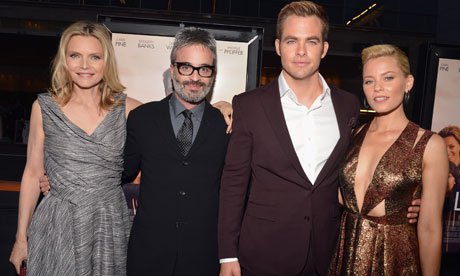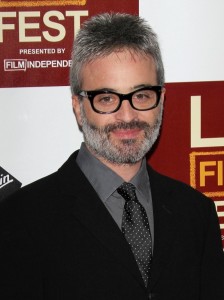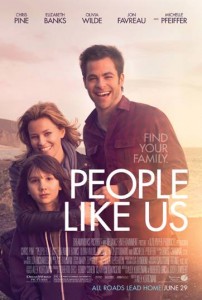

During my recent trip to LA, I had the distinct pleasure to visit Dreamworks Studios and go to a screening of my new favorite movie People Like Us. After the screening we had the pleasure of interviewing director Alex Kurtzman. He shared how personal this film was to him, never thinking it would make it to the big screen. Inspired by true life events – Alex sat down to answer our questions about the film.

Q: Tell us where the story came from?
AK: I met my sister when I turned 30. My dad had had another family before ours (and) we knew about them growing up. But, I’d never met them. I was sitting in my house and in my backyard and I think it was because my wife and I were starting to think about having kids.
And you know (that) makes you think about your family and where you come from. I started thinking…I have a half-sister and a half-brother, and I started thinking about them and wondering who they were and what they were like. And this image came to me. And the image was the last image of the movie. And I didn’t know who those characters were in the image. But it just — it struck me very profoundly as the ending andI thought, “Wow, that — that seems like a really interesting story.”
And I didn’t think much of it and I went to a party that night. A woman walked up to me and said, “I’m your sister.” So that begun the seven years of the odd odyssey of trying to work through it and separate truth from fiction in order to make a movie. And, so what you see is I think in many ways very autobiographical and in other ways there’s a lot of invention in there. But I certainly think there’s a lot of emotional, you know, emotional truth for a lot of people in my family in there.
Q: Did you pitch your idea to here (Dreamworks)?
AK: No. I didn’t pitch it at all. I felt very compelled to write it. And I knew that it was not gonna be something I could sell on a pitch and nor did I want to. Because the truth is, honestly I never really thought this movie would happen. It was just something I had to write. So between the, you know, the “Star Treks” of the world, you know, this was like the safety blanket that I kept going back to. And, you know, Sandra and Frankie became like my best friends. They became like these people who I just loved them so much. All of them, Josh and all the characters — they became so real for me.
I think that early on the process we had written a draft and it was terrible. Our first draft was really bad. I think it was because I had gone so far away from the truth of my own life that it didn’t ring true. And I just felt like everything was contrived. And I took about eight months to sort of sift through that and think about, you know, what I wanted to keep and what story I wanted to tell.
Then I started rebuilding the script. And it was weird because I heard Frankie like that (snaps his fingers). In draft one she never changed for me. I heard her voice. I knew who she was, but I could not hear Sam. And it took seven years to hear Sam. And I kept trying to plug in different jobs to Sam. And it’s funny ‘cause one of the lessons that the script taught me is that what your character does for a living is — is one of the most important choices you can make as a writer.
Because whether it’s about that job or not, it tells you everything about the condition of that character’s life. Are they doing what they love or are they doing what they hate? I kept trying to put all these sort of -(scenarios), Sam – first he had inherited his dad’s — so embarrassing to say — his dad’s fish market, and then he was an audio engineer. And then he was a club promoter. And everything was bad. (Then) one day I was sitting with my friend, and he told me that he was in the barter business before he became a writer. And I said, “What’s the barter business?” And he started talking to me about it. And it was like a light bulb went off. And suddenly I understood — this is it. I mean not only was it sort of the perfect metaphor, but a character who grows up in a house of lies — what would they end up growing up to do? Well they’d grow up to — to sell lies for a living. That’s what they would know how to do. So I love the idea of what happens when that guy is presented with this really tough moral choice that could either be his redemption or his ultimate downfall.
It just took a long time – it took seven years to even get that right, you know. And then finally when I got it and I felt it was right, I gave it to everybody here at Dreamworks. I said, “You guys don’t have to like this and you certainly don’t have to make it. I just wanna know what you think of it.” And I gave it to them on a Thursday and I got a call on Saturday. And they said, “We’re making a movie.” So. Yeah.
Q: Did you know who you wanted to play those roles?
AK: No, not really, because it took eight years to write the script, a lot of actors go through, you know, your life in eight years. And the person who’s right at the beginning isn’t necessarily right at the end. And, you know, there was also a question to me about how old I wanted Sam to be at certain points. And, you know, because (how) he behaves — he makes choices that are so incorrect. There’s a part of me that felt like maybe he should be younger, and then there was a part of me that thought, “No, really, it’s about a guy who is sort of in a real delayed state of adolescence.” And he’s actually 30 and she hasn’t quite grown to that place yet, you know. Chris (Pine) was the first person that I asked, having worked with him on “Trek” and having seen him in theater. I just felt like the thing about Chris for me is that he’s first of all he’s a guy. And I really needed Sam to be a guy. And he’s a man. But when you look at him in here he’s ten years old. And every time I saw him on the monitors I saw this boy. And what I thought was so beautiful about that is that the only way to forgive this character is to understand that he’s really still a child in a lot of ways. That he’s trying so hard to be a good person. He just doesn’t really know what that means at the beginning of the movie. And, um, you know, I loved the idea that, you know, the movie starts and he’s this guy who’s literally selling air. And the movie ends and he’s the guy who’s just utterly, you know, vulnerable standing there on his sister’s doorstep saying like this is who I am, you know. I don’t know how to be better, but I wanna try. That required a lot of range.
And then, I saw a lot of actresses for Frankie and they were all amazing, every one of them. But my worry with Frankie was that she would walk into the room and there would be a heaviness about her given her life. When Elizabeth (Banks) came in, she did the A.A. monologue and the Laundromat monologue. And she kind of threw it away and I felt like I was watching was this person who was trying very hard not to have the words mean what they meant. And because of that they meant so much more. ‘Cause she wasn’t living in the drama of it. She was sort of trying to play it off. And the more she tried, the less capable she was of playing it off. So that by the time you get to the end of those monologues you realize how raw and real she is. And right when her armor is coming down she’s letting Sam in, you know. You know, she’s also just a brilliant comedian, she can kind of spin any line a thousand different ways. She’s unbelievably smart. They both are just so smart. There’s a sharpness about her that I think is conveyed in Frankie’s character because I knew that Frankie had to be like you do not mess with Frankie, you know. Like she could mow you down – but when she did make herself vulnerable, you needed to recognize that it was such an experience and a rare moment for her ‘cause she just didn’t do that. Elizabeth I think conveyed all of that to me and in about two seconds when she started reading.
Q: Did your sister see the film yet? And what did she think about it?
AK : Yeah. She was very proud. We watched it together which is super-weird given the ending.
Q: The six things (rules of life) — where did that come from?
AK: Um, I don’t know. I think that, if I had sat down and thought too much in advance about what the [LAUGHS] six rules of life were, I don’t think I could have written that scene. I’m not actually sure when I got to that scene that I knew that there were gonna be rules in it. What I did know was that at that point in the movie I was looking for a way for Sam to express a lot of things to Josh about his understanding of fatherhood, and his understanding about his own father and his understanding about what it means to be a person in the world. It could have been a monologue. It had probably started it as one. I just felt like — what do you do to like make this moment land, you know. So I guess I was asking myself, “What is Sam realizing here, you know? What is he understanding?” I think what he’s understanding is sort of summed up when he says, “Everything you think is important isn’t everything you think is unimportant is,” is that he’s been living his life focusing on all the wrong details. And it is only at this moment when he’s about to lose everything that he realizes what’s truly important. And he could never have come to the place that he comes to as a character if he hadn’t lost them, you know…I think I was also looking for in my mind Sam had seen these rules on the wall and he’d rejected them because his father had rejected him, so he didn’t wanna pay attention to them. He didn’t wanna know what they were. And when he starts to tell them to Josh really what’s happening is a grandfather’s wisdom is actually taking root in the son and also being passed down to a grandson. And so Sam is hearing them for the first time understanding them realizing maybe there’s more to my father than I thought. And actually I think as a corollary to your question is one of the most important things to me in this movie is — was to say that everyone has a reason. And that you might think a choice seems obvious and right or wrong from the outside. But it is not until you are in somebody’s shoes that you understand how complicated life is and how complicated choices are. And it would have been super-easy to demonize Lillian (MichellePfiefer).
And it would have been super-easy to demonize Jerry (and that he) did a lot of things wrong. But I think part of why I held onto the ending so much and why it was a compass for me was because my hope was that when you saw him in the car you would realize that he was doing the best he could. He just didn’t know how to do any better. He was totally messed up. And that wasn’t to forgive him, but it was to understand that at least he had that desire and that was the best way he could do it. I thought that that was an important reframe for a character who you spent the movie judging, you know. Ultimately what he wanted was to see his kids together. He just couldn’t couldn’t bring them together.
After re-reading the transcript from the interview, I can not stress enough how much I loved this film. The characters are layered, it’s complicated, such as life and it really leaves you feeling all the emotions a great film encompasses. You will laugh, you will get frustrated and you may tear up! Read my full review of the film here!

People Like Us is in theaters today!
“Like” PEOPLE LIKE US on Facebook
Follow PEOPLE LIKE US on Twitter
- You Have to Remember – 9/11, 20 Years Later - September 11, 2021
- Creating the Perfect Look with a Maxi Dress - October 20, 2020
- Brand Better Giveaway - October 6, 2020

